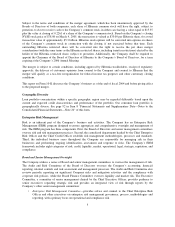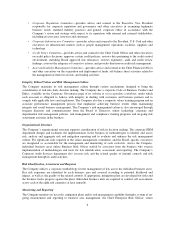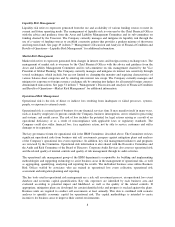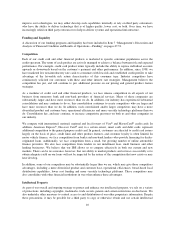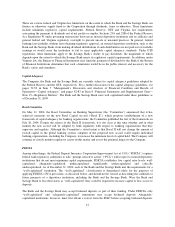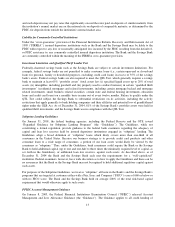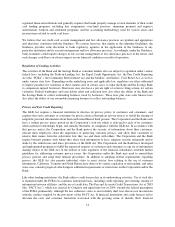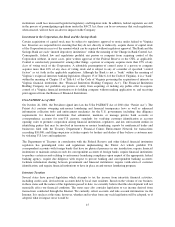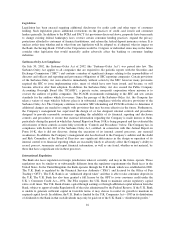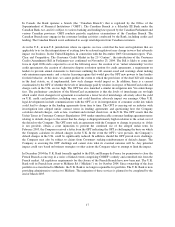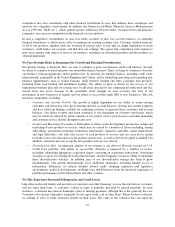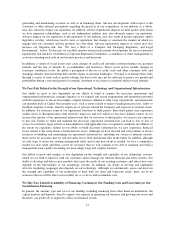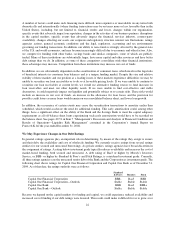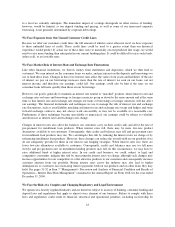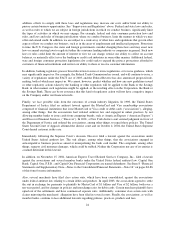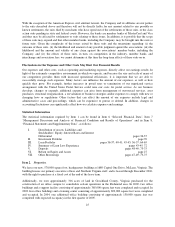Capital One 2004 Annual Report Download - page 38
Download and view the complete annual report
Please find page 38 of the 2004 Capital One annual report below. You can navigate through the pages in the report by either clicking on the pages listed below, or by using the keyword search tool below to find specific information within the annual report.institutions could face increased legislative/regulatory and litigation risks. In addition, federal regulators are still
in the process of promulgating regulations under the FACT Act; there can be no assurance that such regulations,
when enacted, will not have an adverse impact on the Company.
Investment in the Corporation, the Bank and the Savings Bank
Certain acquisitions of capital stock may be subject to regulatory approval or notice under federal or Virginia
law. Investors are responsible for ensuring that they do not, directly or indirectly, acquire shares of capital stock
of the Corporation in excess of the amount which can be acquired without regulatory approval. The Bank and the
Savings Bank are each “insured depository institutions” within the meaning of the Change in Bank Control Act.
Consequently, federal law and regulations prohibit any person or company from acquiring control of the
Corporation without, in most cases, prior written approval of the Federal Reserve or the OTS, as applicable.
Control is conclusively presumed if, among other things, a person or company acquires more than 25% of any
class of voting stock of the Corporation. A rebuttable presumption of control arises if a person or company
acquires more than 10% of any class of voting stock and is subject to any of a number of specified “control
factors” as set forth in the applicable regulations. Although the Bank is not a “bank” within the meaning of
Virginia’s reciprocal interstate banking legislation (Chapter 15 of Title 6.1 of the Code of Virginia), it is a “bank”
within the meaning of Chapter 13 of Title 6.1 of the Code of Virginia governing the acquisition of interests in
Virginia financial institutions (the “Financial Institution Holding Company Act”). The Financial Institution
Holding Company Act prohibits any person or entity from acquiring, or making any public offer to acquire,
control of a Virginia financial institution or its holding company without making application to, and receiving
prior approval from, the Bureau of Financial Institutions.
USA PATRIOT Act of 2001
On October 26, 2001, the President signed into law the USA PATRIOT Act of 2001 (the “Patriot Act”). The
Patriot Act contains sweeping anti-money laundering and financial transparency laws as well as enhanced
information collection tools and enforcement mechanics for the U.S. government, including: due diligence
requirements for financial institutions that administer, maintain, or manage private bank accounts or
correspondence accounts for non-U.S. persons; standards for verifying customer identification at account
opening; rules to promote cooperation among financial institutions, regulators, and law enforcement entities in
identifying parties that may be involved in terrorism or money laundering; reports by nonfinancial trades and
businesses filed with the Treasury Department’s Financial Crimes Enforcement Network for transactions
exceeding $10,000; and filing suspicious activities reports by brokers and dealers if they believe a customer may
be violating U.S. laws and regulations.
The Department of Treasury in consultation with the Federal Reserve and other federal financial institution
regulators has promulgated rules and regulations implementing the Patriot Act which: prohibit U.S.
correspondent accounts with foreign banks that have no physical presence in any jurisdiction; require financial
institutions to maintain certain records for correspondent accounts of foreign banks; require financial institutions
to produce certain records relating to anti-money laundering compliance upon request of the appropriate federal
banking agency; require due diligence with respect to private banking and correspondent banking accounts;
facilitate information sharing between government and financial institutions; require verification of customer
identification, and require financial institutions to have in place an anti-money laundering program.
Interstate Taxation
Several states have passed legislation which attempts to tax the income from interstate financial activities,
including credit cards, derived from accounts held by local state residents. Based on the volume of our business
in these states and the nature of the legislation passed to date, we currently believe that this development will not
materially affect our financial condition. The states may also consider legislation to tax income derived from
transactions conducted through the Internet. We currently solicit accounts and take account information via the
Internet. It is unclear at this time, however, whether and in what form any such legislation will be adopted, or if
adopted, what its impact on us would be.
15


